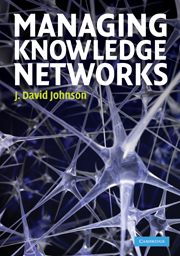Book contents
- Frontmatter
- Contents
- List of figures
- List of tables
- List of boxes
- Preface
- Acknowledgments
- 1 Introduction and overview
- Fundamentals
- Contexts
- Pragmatics
- 9 Creativity and innovation
- 10 Productivity: efficiency and effectiveness
- 11 The human side
- 12 Finding knowledge
- 13 Decision making
- 14 Summary and commentary
- References
- Index
- References
10 - Productivity: efficiency and effectiveness
Published online by Cambridge University Press: 05 June 2012
- Frontmatter
- Contents
- List of figures
- List of tables
- List of boxes
- Preface
- Acknowledgments
- 1 Introduction and overview
- Fundamentals
- Contexts
- Pragmatics
- 9 Creativity and innovation
- 10 Productivity: efficiency and effectiveness
- 11 The human side
- 12 Finding knowledge
- 13 Decision making
- 14 Summary and commentary
- References
- Index
- References
Summary
The major downfall of the network approach is that they are such sparse social structures that it is difficult to see how they can account for what we observe.
(Fligstein and Mara-drita 1992, p. 20, quoted in Swedberg 1994, p. 270)…the exact contribution of communication processes towards outcomes is often hard to assess, and the connection is more intuitive than demonstrated or empirically proven.
(Downs, Clampitt, and Pfeiffer 1988, p. 171)…the chain of conditions between amount of communication in the workplace and outcomes such as satisfaction, effectiveness, or other effects may be quite lengthy.
(Zimmerman, Sypher, and Haas 1996, p. 200)I will use productivity in its broadest sense here, focusing on the generation of wealth in organizations in a variety of forms entailing social as well as economic capital, which also suggests some degree of efficiency and of effectiveness. Since these terms are closely interrelated I will begin with some basic definitional issues. As the colon in the chapter title implies, productivity is a function of both effectiveness and efficiency, with the former term somewhat more difficult to define concretely.
Effectiveness details a desired outcome or result. It therefore implies some degree of rationality, intention, and purpose and could be closely associated in this sense with more functional approaches to organizations. It implies some martialing or matching of organizational outputs to particular goals that here I will discuss primarily in terms of contingency impacts and resource-based views of strategy.
- Type
- Chapter
- Information
- Managing Knowledge Networks , pp. 196 - 209Publisher: Cambridge University PressPrint publication year: 2009



